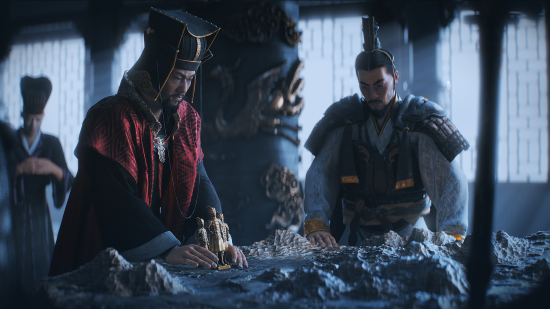Spying returns in Total War: Three Kingdoms, but with an entirely new system governing it. Whereas in most previous Total Wars, spies were a dedicated class of Agent (a campaign hero), in Three Kingdoms they are recruited from among the ranks of your regular characters.
Characters have personality traits, likes and dislikes, friendships and rivalries, and these can all affect their satisfaction with their place in the world, both in relation to your faction and your enemies. Under the right conditions, a character may become “willing” to spy on an enemy for you – at which point you can instruct them to do so.
Their usefulness will depend on their seniority in the enemy faction. Initial benefits are limited to getting line of sight on enemy cities, but escalate to various acts of sabotage and assassination – such as poisoning supplies – as that character develops and rises through the ranks.
“If he’s promoted to general then you can see armies moving around,” game director Janos Gaspar tells us. “If he’s a governor, then you can affect different cities. When he becomes more established, you can even take over these armies or bring the city across [to you]. If a faction heir or faction leader is your spy, you can even incite civil war in a faction.”
Some of this is within your control, senior designer Leif Water says. “The better a character [your spy] is, the higher the chance that this faction will actually deploy him and allow him to rise up in the ranks. If he is a very strong character, he might be a minister in no time, which increases your influence in that faction, and what you can do with that character.”

Long-established spies can even build up “an undercover network” by reaching out to “the shady people” in a rival faction, granting further opportunities.
“So they can perform more influential actions over time as they build up their connections,” Walter says. “Obviously you don’t benefit from them right away, but you can get these bigger actions later on, the longer you wait.”
Naturally, you can be spied on too, and Walter and Gaspar look forward to the paranoia this will engender. “You never know who is a spy. You have to constantly think about whether there might be one in your faction,” Gaspar says. “You can wrongly accuse people.”
This has particular implications for multiplayer. “If we play a multiplayer campaign, I might tell you your faction leader is actually a spy of mine,” Walter says, with gleeful malice.

Spy actions have a monetary cost associated with their difficulty, but because Creative Assembly doesn’t want to introduce too much RNG to the system, spy actions will always succeed. The risk comes with the chance of discovery. This varies according to several modifiers, such as a spy’s ability, and that of the targeted faction’s defensive network. If a spy is uncovered, executing them is naturally an option, but you can also choose to turn them, and send them back at their former employer as a double agent.
Total War: Three Kingdoms releases in spring next year – hit that link for everything we know about it so far, or click here to read our hands-on preview of an ambush battle. It’s all shaping up pretty nicely, in my opinion, but Creative Assembly are still keeping the most exciting stuff under wraps. I’ve enjoyed what we’ve seen so far (and it certainly looks pretty), but we really need a closer look at this espionage stuff.
